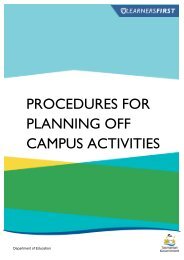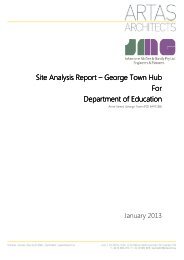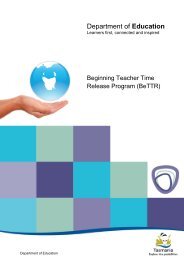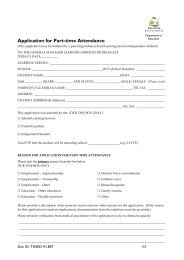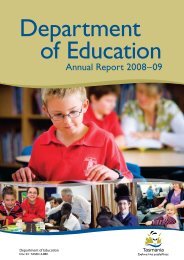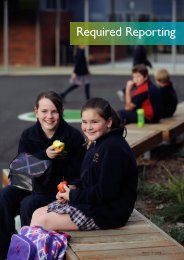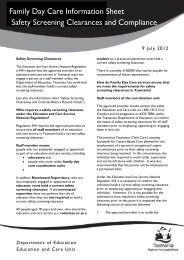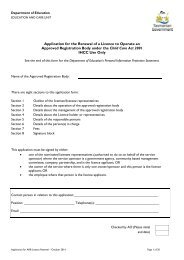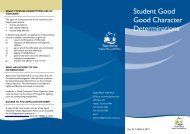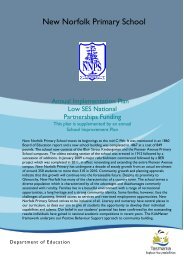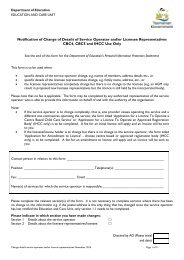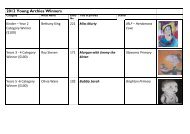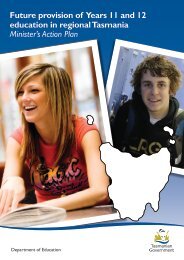Education
DoE Annual Report 2012-2013 - Department of Education
DoE Annual Report 2012-2013 - Department of Education
- No tags were found...
Create successful ePaper yourself
Turn your PDF publications into a flip-book with our unique Google optimized e-Paper software.
• all students in Tasmanian Government schools receiving<br />
high quality teaching focused on the achievement of<br />
high standards<br />
• student progress being assessed, monitored and<br />
reported against standards that are consistent<br />
across schools<br />
• a fair and just distribution of the benefits of schooling<br />
across all students, leading to minimal difference in<br />
measurable outcomes between identified student groups<br />
• all students in Tasmanian Government schools receive<br />
teaching that appropriately utilises information<br />
and communication technology to provide more<br />
effective learning<br />
• all students participate fully in schooling and complete<br />
schooling until the end of Year 12 or the equivalent<br />
• students perform at nationally comparable<br />
achievement levels<br />
• parents of students participating in the schooling of<br />
their children, and the community and the general<br />
public informed on educational matters and involved<br />
in their school communities<br />
• improved access to child care services that meet state<br />
licensing guidelines and national standards for all parents,<br />
carers and families.<br />
Output Group 2: Post-Compulsory <strong>Education</strong><br />
and Skills Development<br />
Description<br />
The purpose of this output group is to facilitate the provision<br />
of Years 11 and 12 education and formally recognised VET by<br />
registered training providers, including schools.<br />
The outputs in this group directly address the long-term<br />
vision and goals set out in the Tasmanian Skills Strategy, the<br />
Tasmanian Innovation Strategy, the Infrastructure Strategy and<br />
the National Agreements for Skills and Workforce Development<br />
and <strong>Education</strong>.<br />
The department’s outcomes to which this output group<br />
contributes are:<br />
• all students in Tasmanian schools and colleges receive<br />
quality teaching leading to effective learning<br />
• all students participate fully in schooling and complete<br />
schooling until the end of Year 12, or a training course<br />
leading to a Certificate III outcome<br />
• students perform at nationally comparable<br />
achievement levels<br />
• all students in Tasmanian Government schools continue<br />
to receive teaching that appropriately utilises information<br />
and communications technology leading to more<br />
effective learning<br />
• fair and just distribution of the benefits of schooling<br />
across all students and minimal difference in measurable<br />
outcomes between identified student groups<br />
• parents of students continue to participate in the schooling<br />
of their children and the community and the general public<br />
continue to be well informed on educational matters and<br />
involved in their school communities<br />
• a strong adult training system including the Tasmanian<br />
Skills Institute and the Tasmanian Polytechnic and a strong<br />
system of private training<br />
• provision of a quality assurance and regulatory framework<br />
for vocational education and training, involving:<br />
º º registration of training providers<br />
º º accreditation of courses<br />
º º recognition of overseas qualifications.<br />
• approval and monitoring of apprentice and trainee<br />
training contracts<br />
• management of the purchase of vocational education<br />
and training from registered training organisations to<br />
ensure that:<br />
º º the number of Tasmanians with post-compulsory<br />
education and training qualifications increases<br />
º º partnership arrangements are developed between<br />
schools, colleges and the Tasmanian Polytechnic<br />
º º training provision is aligned to the government’s<br />
economic and social policy including Tasmania’s<br />
development strategies and the needs of industry.<br />
Output Group 3: LINC Tasmania<br />
Description<br />
The purpose of this output group is to provide statewide<br />
library and information services, archival and community<br />
learning services.<br />
The department’s outcomes to which this output group<br />
contributes are:<br />
• provision of lifelong learning of all Tasmanians through<br />
the delivery of information, education and training,<br />
literacy support and other community services<br />
through the Learning and Information Network<br />
Centre (LINC) network<br />
• an informed, empowered and technologically literate<br />
community of lifelong users of information and<br />
information technology<br />
• an improved quality of life for all Tasmanians and a<br />
culturally rich community<br />
• sustained economic development in the information<br />
age through community and individual innovation<br />
• equity of access to information and to resources for<br />
innovation<br />
• a community which values knowledge and ideas and<br />
learning for life<br />
• the enhanced capacity and increased opportunity for<br />
the community to have access to and use the cultural<br />
memory and documentary record of Tasmania<br />
• ensuring that government accountability is able to be<br />
monitored and assessed by the Tasmanian community<br />
through access to the evidence of the activities of the<br />
government.<br />
Other<br />
Departmental activities are classified as either controlled<br />
or administered.<br />
Controlled activities involve the use of assets, liabilities,<br />
revenues and expenses controlled or incurred by the<br />
department in its own right. Administered activities<br />
involve the management or oversight by the department<br />
on behalf of the government of items controlled or<br />
incurred by the government.<br />
The department is predominantly funded through<br />
parliamentary appropriations. It also provides services<br />
on a fee for service basis, as outlined in note 7.3. The<br />
financial report encompasses all funds through which the<br />
department controls resources to carry on its functions.<br />
Financial Statements » Notes<br />
111



